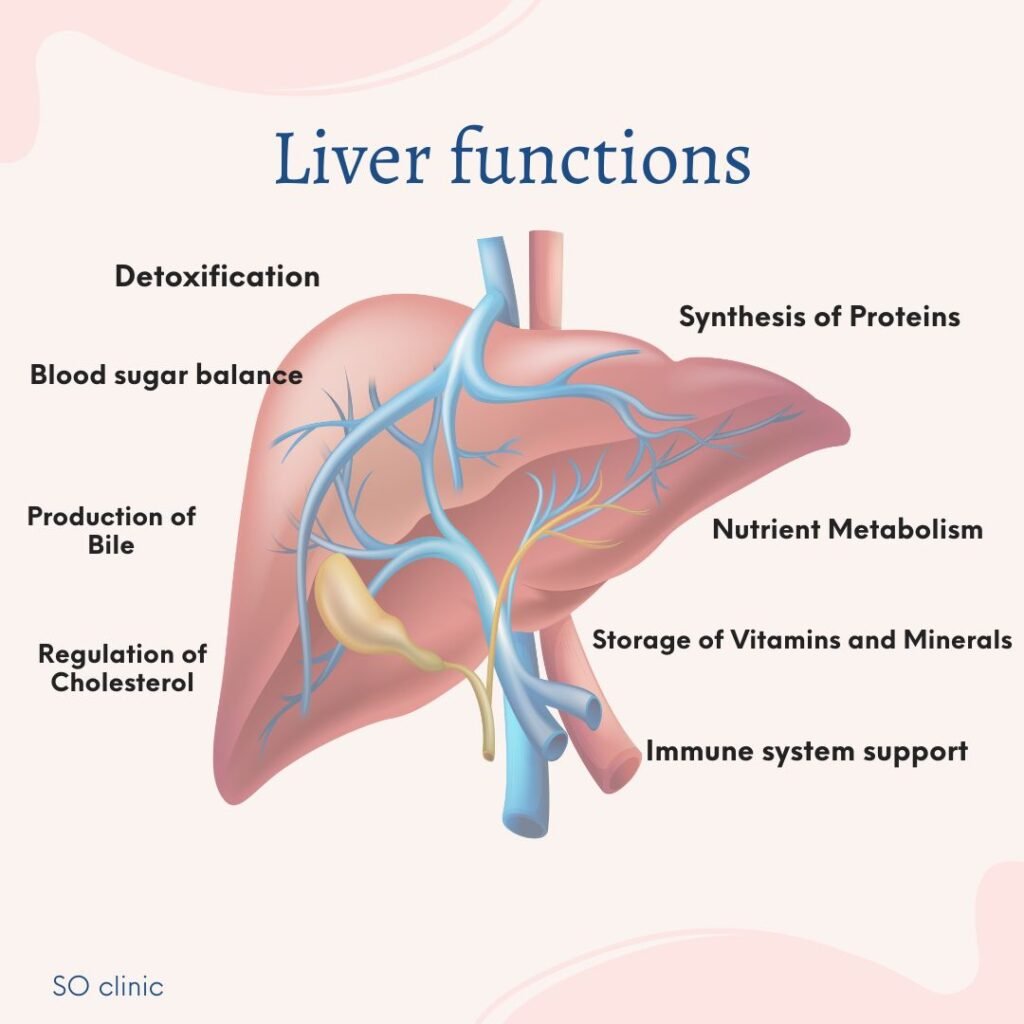The liver is one of the most vital organs in the human body, performing over 500 functions essential
to maintaining overall health. A healthy liver is key in processing nutrients, filtering toxins, and
regulating biochemical processes that sustain life. Understanding its functions and role in
detoxification highlights why liver health is crucial for overall wellness.
Key Functions of the Liver.
1. Detoxification The liver is primarily
known for its ability to detoxify
harmful substances. Every day, your
body is exposed to toxins—whether
from food, medication, alcohol,
environmental pollutants, or even the
natural byproducts of metabolism. The
liver filters these toxins from the blood
and processes them for elimination,
ensuring they do not accumulate.
Without the liver’s detoxifying role,
toxins would overwhelm the body,
leading to dieseases.

2. Nutrient Metabolism One of the
liver’s essential tasks is metabolising
nutrients. After food is digested in the
stomach and intestines, the nutrients are
transported to the liver via the
bloodstream. The liver processes
carbohydrates, proteins, and fats, converting them into energy or storing them. For instance,
it stores glucose as glycogen and releases it when the body requires energy, helping maintain
blood sugar levels.
3. Production of Bile. Bile is a digestive fluid produced by the liver that is essential for the
breakdown and absorption of fats. The liver continuously produces bile, which is stored in
the gallbladder and released into the small intestine during digestion. This process not only
helps in the digestion of fats but also the absorption of fat-soluble vitamins like A, D, E, and
K.
4. Synthesis of Proteins The liver is responsible for synthesising many critical proteins in the
body. One of the most important is albumin, which helps maintain blood volume and
pressure by keeping fluid within the blood vessels. The liver also produces clotting factors
that are essential for stopping bleeding when injuries occur.
5. Regulation of Cholesterol The liver plays a central role in regulating cholesterol levels. It
produces cholesterol, which is necessary for the synthesis of hormones and the production of
cell membranes. Additionally, the liver converts excess cholesterol into bile salts, which are
used in digestion or excreted, thereby helping maintain balanced cholesterol levels.
6. Storage of Vitamins and Minerals The liver is a storage hub for essential vitamins and
minerals, including vitamins A, D, E, K, and B12, as well as iron and copper. These
nutrients are stored until the body needs them for various physiological functions.
The Liver and Detoxification
The detoxification process in the liver involves two primary phases—Phase 1 and Phase 2
detoxification.
1. Phase 1 Detoxification: Modification In Phase 1, liver enzymes known as cytochrome
P450 enzymes modify toxins, drugs, and other harmful substances. This modification
process prepares these compounds for Phase 2 by making them more reactive. While Phase
1 detoxifies many substances, it also produces intermediate compounds that can be even
more toxic than the original substances. These compounds are immediately passed on to
Phase 2 to be neutralised.
2. Phase 2 Detoxification: Conjugation Phase 2 is known as the conjugation phase. During
this phase, the liver neutralises the reactive and toxic intermediates produced in Phase 1 by
binding them to water-soluble molecules, such as glutathione, sulfur, or amino acids. This
process renders the compounds non-toxic, allowing them to be excreted through urine or
bile
This two-step detoxification system works continuously to protect the body from toxic overload.
Maintaining liver health ensures this process functions efficiently, reducing the risk of toxin
accumulation and associated health issues.
Supporting Liver Health
Maintaining a healthy liver is crucial, given its extensive role in detoxification, energy production,
digestion, and more. Here are a few ways to support liver function:
Eat a Nutrient-Dense Diet: Fruits and vegetables are rich in antioxidants that support liver
detoxification. Cruciferous vegetables (like broccoli, kale, and cauliflower) contain
compounds that enhance liver enzyme activity.
- Eat a Nutrient-Dense Diet: Fruits and vegetables are rich in antioxidants that support liver
detoxification. Cruciferous vegetables (like broccoli, kale, and cauliflower) contain
compounds that enhance liver enzyme activity. - Limit Alcohol Consumption: Alcohol places a heavy burden on the liver, impairing its
ability to detoxify and regenerate. Limiting alcohol intake can significantly support liver
health. - Stay Hydrated: Adequate water intake helps flush toxins out of the body through urine and
supports the liver’s detoxifying processes. - Exercise Regularly: Physical activity enhances circulation, aids liver detoxification, and
promotes weight management, reducing strain on the liver. - Consider Herbal Support: Herbs like milk thistle, dandelion root, and turmeric have been
shown to support liver health by enhancing detoxification and promoting liver cell
regeneration
